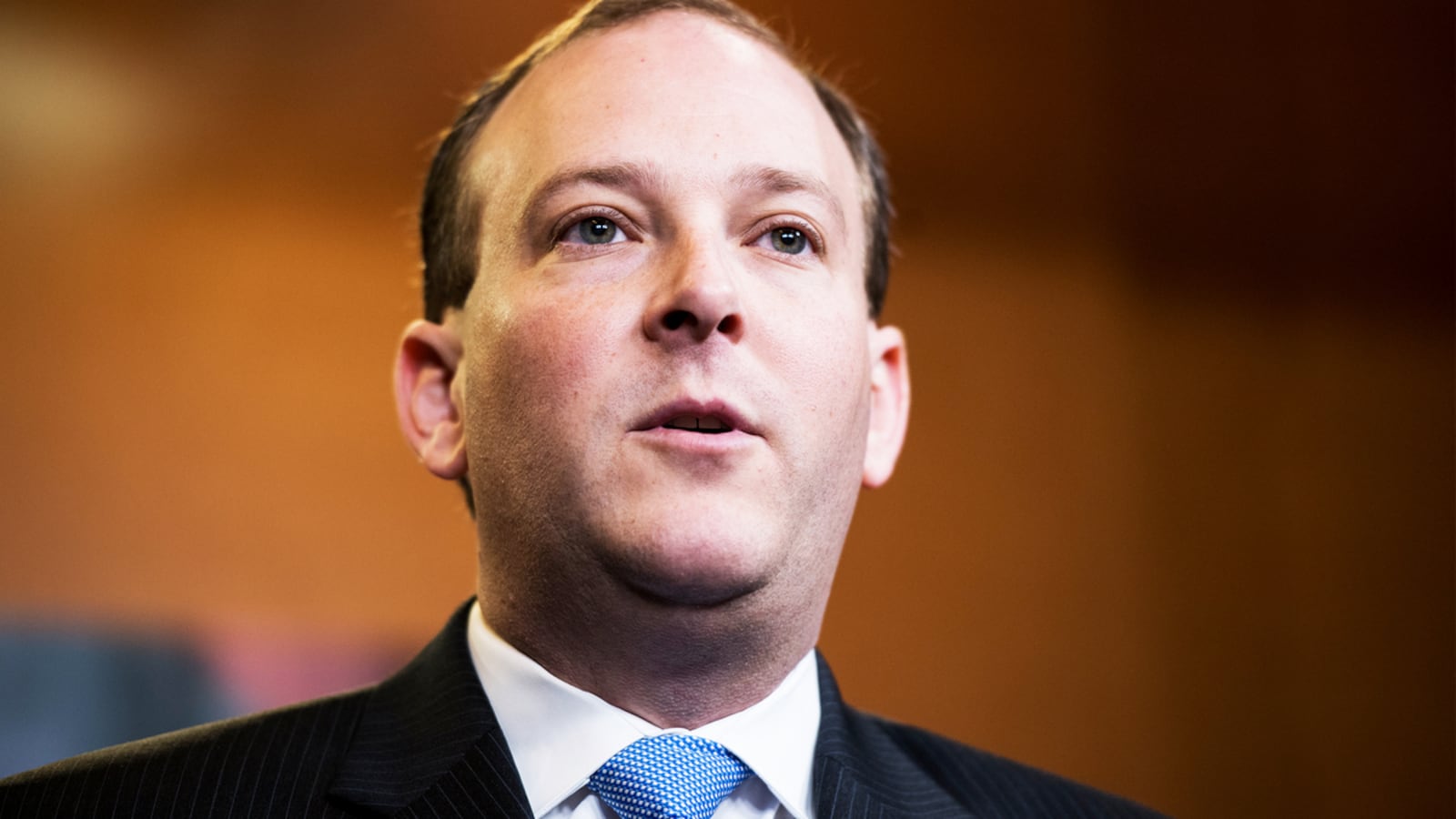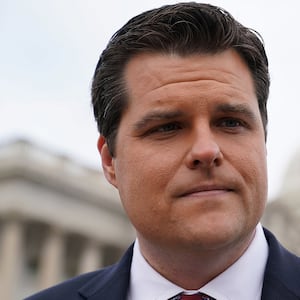Night had fallen on the U.S. Capitol and congressman Lee Zeldin had just left another grueling session of the impeachment inquiry before stepping into the lights of the assembled TV cameras and settling into his new role.
That day, the media was peppering a quartet of GOP lawmakers—including some of Trump’s most vocal supporters on Capitol Hill—about the 10-hour deposition of the former U.S. ambassador to Ukraine, Marie Yovanovitch, which had just wrapped up behind closed doors. And as Rep. Jim Jordan (R-OH)—one of the president’s top Capitol Hill attack dogs—took the lead in beating back the questions, Zeldin, a three-term Republican lawmaker from New York, felt compelled to elbow in and say his piece.
“How about the Democrats provide the Republicans and the president the same exact rights that they would demand if everything was reversed?” Zeldin asked. “You're talking about an impeachment of the President of the United States, and everything is going to happen behind closed doors, offering no protection whatsoever. No transparency, no accountability, no due process.”
Next to him, Jordan stood silent, smiling, like an owner admiring the trick his young pup had learned. Zeldin was on a roll, popping off like he’d been marinating in indignation all day.
“This process is a joke,” the congressman said. “And the consequences are huge.”
The impeachment inquiry—made official by Speaker Nancy Pelosi a month ago—has placed Republican members of Congress largely into two categories: those who are willing to concede discomfort with the president’s actions and those who are determined to show their loyalty and devotion. Few have embraced the latter mission more than Zeldin.
Hardly a household name before impeachment began, the New York Republican has used the stage it’s provided to take something of a star turn within GOP circles. The congressman has been at each one of the depositions of key witnesses, which have often run for eight or more hours. And each time he has dutifully appeared afterward in front of the cameras to push back strongly against the impeachment process, speaking in angry diatribes and tenacious interviews with the press. Zeldin has been a fixture on Fox News, too, and has brought his pugnacity to social media as well. During one recent cable hit from the Capitol, he showed off a bit of Trumpain flair, declaring that Hillary Clinton needed “to see a psychiatrist.”
His efforts have not gone unnoticed. One former White House official said that the congressman is “one of” Donald Trump Jr.’s “favorite congressmen.” And Rep. Matt Gaetz (R-FL), a Trump confidant, told The Daily Beast that in a recent conversation the president “exuded praise” for Zeldin.
“He’s brilliant and tenacious,” said Gaetz. “Lee understands how to fight in the era of Trump… He’s a cut above most in the House."
To his GOP colleagues on the Hill, Zeldin has become a trusted source of information on the internal goings-on of impeachment. A senior House Republican aide described him as “both aggressive and articulate in documenting the litany of Democrat abuses of this process, which has made him one of our most effective communicators on this issue.”
The other side of the aisle has taken notice too. Though he was never considered a moderate, Zeldin had been known to have a positive rapport with Democrats. But that seems to be changing. “Used to be good,” said one Democratic aide when asked about Zeldin’s reputation in the party. “But he’s gone off into crazy Trumpworld recently.”
What sets Zeldin apart from the rest of the House conservative firebrands eager to carry the water for Trump is that he is the only one with a remotely competitive 2020 re-election fight.
His district, which covers the eastern half of Long Island, went for Trump by a 12-point margin in 2016. But it’s long been a swing seat on the congressional level, and voters have frequently swapped out representatives from different parties over the years. In 2018, Democrats fell just short there: though Zeldin was a top Democratic target, he defeated his opponent by just over four points. They are itching at another shot at the congressman in 2020, and some Democrats believe his vigorous advocacy on behalf of Trump will be a serious liability for him next November.
Zeldin, obviously, feels differently.
“Most of the calls that we get are people who are opposed to the impeachment,” he told The Daily Beast in a brief interview. He acknowledged that tally was far from unanimous, but he predicted that the people who show up to vote in 2020 will be far more like those who showed up in 2016 to deliver the district to Trump and award Zeldin the most votes ever for a congressional candidate in the 1st District.
At 39, Zeldin is one of the youngest members of the House GOP conference. His speaking style is polished and fast—less moody uncle yelling at the TV and more nice young man quasi-yelling while on the TV. He may play the role of attack dog. But he can also be approachable. After taking out his earpiece and walking toward the secure basement room where the impeachment inquiry is unfolding on Tuesday, he dropped the schtick a bit, speaking slower and steadier as he walked through the dynamics of his district and why his support of the president would pay off in 2020.
“President Trump's name was on the ballot for Democrats,” said Zeldin of the 2018 midterm as he stood in a hallway near the SCIF, waiting for the same Trump-hugging crew—consisting of Jordan and Rep. Scott Perry (R-PA)—that always strides into the depositions together in formation, trailed by their binder-toting staffers. “His name wasn't on the ballot for Republicans,” said Zeldin, “and that impacted the turnout model in 2018.”
Zeldin wasn’t always a Trump diehard. He was lukewarm to his candidacy in 2016, only endorsing Trump when he became the presumptive GOP nominee in spring of that year. When he did make his endorsement, he couched it by saying he didn’t agree with Trump on everything but that he was a better candidate than Hillary Clinton.
In Congress, he has worked to cut a profile as an independent-minded lawmaker. One of his first TV ads in 2018 focused on his work on the environment, a key issue in his coastal district, and he frequently emphasizes his Long Island roots and service in the military. He is known to personally call constituents who frequently contact his office to complain.
Along the way, he sought to become a go-to Republican on foreign policy. One of just two Jewish members of the House GOP, he has frequently been front-and-center of the party’s campaign to denounce Democrats like Rep. Ilhan Omar (D-MN) for their rhetoric on Israel. His position as the top Republican on the House Foreign Affairs Committee’s panel on oversight is why he’s found himself in the middle of the impeachment inquiry.
The congressman’s work on those and other matters is what first endeared him to Trumpworld. “While Lee has less of a brand name than a Jim Jordan or Mark Meadows, he’s become more prominent not just in the last several weeks but probably in the last two years,” the former White House official told The Daily Beast.
But now, it’s that relationship that is complicating his future in Congress. Democrats hoping to finally oust Zeldin realize that his political hopes will likely live or die on how impeachment plays. Perry Gershon, his 2018 Democratic opponent who is one of two Democratic candidates running in 2020, is treating the impeachment push as a golden opportunity to argue that Zeldin is no longer in touch with his district. Gershon’s Twitter feed is full of messages that Zeldin cares more about Trump-approved conspiracy theories than pocketbook issues like health care or the state and local tax deduction.
But Zeldin seems unbothered by the idea that he’s become monomaniacally focused on defending Trump. As he headed into a deposition with the top U.S. diplomat in Ukraine, Bill Taylor—who would minutes later deliver a shocking account that established the quid-pro-quo arrangement that even some Republicans have held out as a red line—Zeldin did not say if there were anything the president could do that would cause him to give up his defense.
“The evidence has obliterated so much of what they're charging,” he told The Daily Beast, “and I can't just ignore facts to play along with that hypothetical.”
—with reporting from Sam Stein







